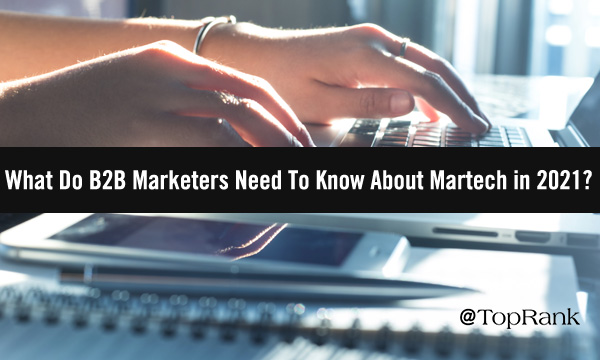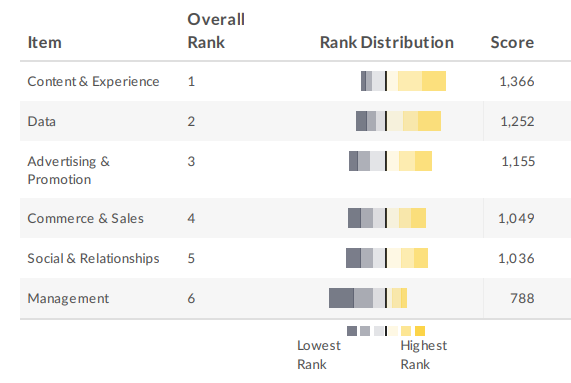
If the 1982 movie Blade Runner and its dystopian depiction of what the world would look like in 2019 were accurate, this is what we’d have been living through last year:
Needless to say, our predictions of society’s future state, and technology’s long-term evolution, are not always on the money. While certain aspects of Blade Runner’s vision might’ve been frighteningly accurate, Los Angeles is not yet inhabited by flying cars or giant video advertisements projected onto the entirety of skyscrapers.
With that said, today’s marketers can much more easily look ahead to 2021 — suddenly only a few short months away — and make educated guesses about what the year will hold. Many of the marketing technologies that will transform business and drive strategies are already on the rise, if not gaining mainstream traction.
Martech 2021: 5 Trends to for B2B Marketers to Watch
Businesses and marketing departments might be facing spending restrictions and budget cuts amidst the turmoil of 2020, but marketing technology is not an area that’s widely being affected. On the contrary, in fact: The latest Pulse Survey from ClickZ found that marketing technology budget shares rose from 32% to 42% between May and late July.
Where are organizations investing, and which technologies will rule the roost in the coming year? Here are five evidenced trends I’ll be following:
1 — Content experiences are at the forefront
In ClickZ’s research, this is the category that was leading marketing technology’s growth here in 2020.
“People being indoors and looking for new ways to educate themselves about the current climate and consumer content can safely be considered as one of the reasons businesses are tirelessly looking to enhance their target audiences’ experience,” wrote Kamaljeet Kalsi.

(Source)
This isn’t such a novel concept — TopRank Marketing CEO Lee Odden was among those preaching experiences as the future of content marketing many years ago — but technology is continually improving our ability to deliver content in ways that are more interactive, immersive, and impactful.
I think back to last week’s blog post on storytelling, and Joseph Gordon-Levitt’s assertion that video games offer the most promise on this front. Technology will continue to bring more capabilities to the table in terms of gamification, interactivity, and innovation.
Making content consumers feel like participants rather than onlookers holds the key to heightened engagement.
2 — Facilitating a socially distant world
Will there be in-person events in 2021? It’s possible but doesn’t feel very likely right now — certainly not at the scale of annual conferences and summits we’ve come to love. As brands keep working to build relationships with prospects and customers from a distance, technology will need to do much of the heavy lifting.
We’ve already seen some great new tools and capabilities arise this year in terms of teleconferencing, live-streaming, and virtual events. What else might emerge, with a litany of tech companies now centering their focuses on what has suddenly become a ubiquitous need?
In a way, this development helps to level the playing field for smaller businesses. While it may not be feasible for a startup sales enablement shop to organize a massive gathering like Dreamforce, bringing people together through interactive virtual events is a different story. In fact, this format can actually make it easier to follow up, convert, and attribute results concretely.
It’s not just about technology that helps engage customers from afar. It’s also about technology that helps marketers collaborate and work together in distributed settings. And adopting these tools will benefit companies and agencies long-term, because the remote work trend was already on the rise long before COVID struck.
In 2021, marketers will truly equip themselves for the future of work. We’re already well on our way; according to a recent survey, “companies reported that responding to the new circumstances of the pandemic accelerated their digital communications strategy by 6 years on average.”
“As brands keep working to build relationships with prospects and customers from a distance, technology will need to do much of the heavy lifting.” — Nick Nelson @NickNelsonMN Click To Tweet3 — Data privacy and cybersecurity gain urgency
Data exploitation became a huge story after the 2016 election, and I regret to inform you it’s likely to bubble up again this fall. Even outside of that, cybersecurity has been a growing concern for many years and becomes all the more pertinent as customer data is increasingly decentralized and cloud-based.
While these matters have often fallen under the purview of IT in the past, marketing needs to have a seat at the table and a voice in the discussion. Sending a convincing message that it’s safe to do business with your brand — sensitive data won’t be shared, lost, stolen, or misused — and backing it up is essential to building trust in the new world of business.
4 — Simplicity and synchronicity are vital
In its latest marketing technology landscape visualization, Chief Martech charted some 8,000 different solutions in the wild. Eight thousand!

The beauty of this vast landscape is that marketing technologies now exist to address almost any need imaginable. The downside, of course, is that the sheer volume and range of options can feel completely overwhelming. The balance between not enough martech and too much martech is a delicate one.
In the near future, streamlining will be the name of the game. How can you carve down your tech stack to the true essentials? Which solutions can cover multiple needs for your team? How can you solicit a continuous feedback loop so users are able to openly communicate when a tool isn’t working for them, and action is taken rapidly?
Finding the answers to these questions will help marketing organizations find greater efficiency and effectiveness with martech in 2021.
“The balance between not enough martech and too much martech is a delicate one.” — Nick Nelson @NickNelsonMN Click To Tweet5 — Artificial intelligence keeps growing and embedding
The buzz around marketing technology seems to vary from month to month, with a new category or niche entering and then exiting the spotlight. One that never seems to lose its luster, however, is AI. This is because the technology is powerful and endlessly applicable.
We already see AI being widely leveraged in modern marketing strategies — chatbots, predictive analytics, deep learning, etc. — but the potential remains so much greater, and I believe we’ll continue to see it realized in the coming year. One threadline I’ll be keeping a close eye on is formative AI, cited as a trend driving Gartner’s hype cycle of emerging technologies in 2020.
“Formative AI is a type of AI capable of dynamically changing to respond to a situation,” according to Gartner. “There are a variety of types, ranging from AI that can dynamically adapt over time to technologies that can generate novel models to solve specific problems.”
How could formative AI come into play for marketing in order to drive more personalized and memorable B2B marketing experiences? Go ahead and dream on it. That’s what separates us from the machines, after all. (Or at least one of the differences pondered by Blade Runner and its source material.)
Marketing Technology Will Always Have Its Place
This chaotic year of 2020 has served to reinforce the immense value of technology in my day-to-day. Without having easy access to chat apps, video-conferencing platforms, shared documents, and other digital tools, a day in the life of a content marketer during the pandemic would be far more challenging and inefficient. Instead, I’m basically able to do my job seamlessly without much disruption, other than the lack of seeing my coworkers’ faces IRL.
I do miss that very much, and for all the talk about technologies to watch in 2021, I’m most hopeful for a return to semi-normal human interaction and physical proximity. Up until then, and after, martech will help us continue to keep audiences (and ourselves) educated, entertained, engaged and connected through the digital space.
I don’t know about flying cars or skyscraper billboards, but I can say with confidence that the future of marketing and its technologies is going to look a lot more like 2020 than any years preceding.
For more insight into what the next year may hold, click over to our post from Lane Ellis on 8 Things B2B Marketers Need To Know About Reddit in 2021.



